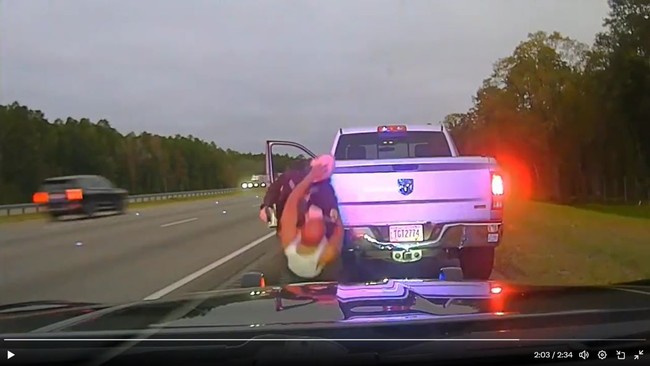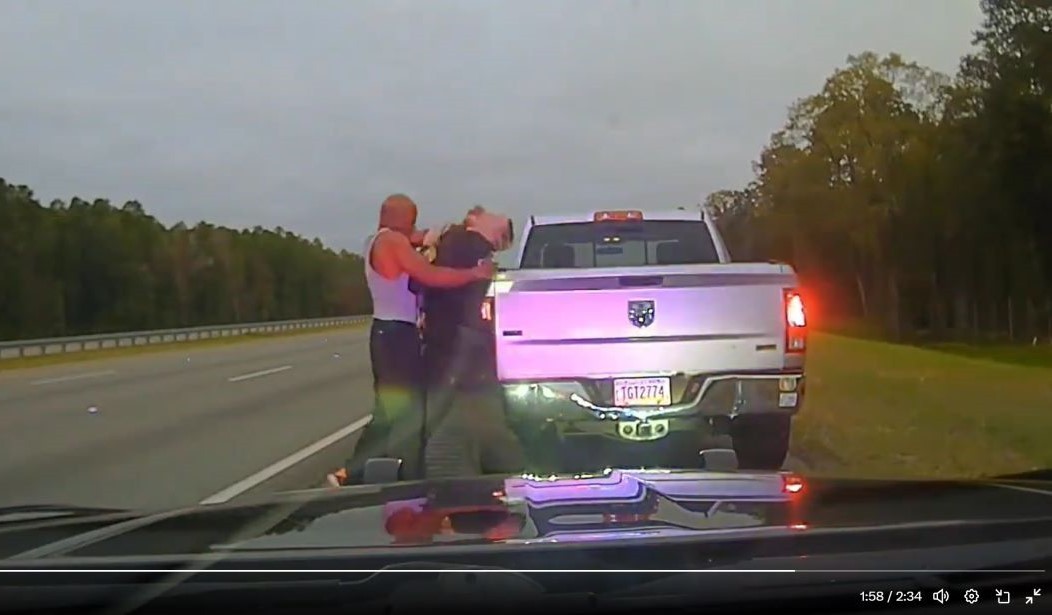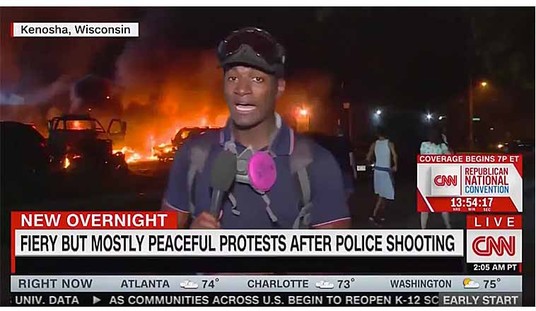On Monday, a man named Leonard Cure was killed by a cop (Staff Sgt. Buck Aldridge of Camden County, Georgia) during a traffic stop and this has been gaining attention in the news this week. As best as we can tell, there are three reasons why the attention has been increasing:
1) Cure is black and Aldridge is white, and the media always assumes that means the officer is racist. In some circles, whether or not a person is racist is judged by the color of one’s skin and not the content of your character, without any sense of irony.
2) Three years ago, Cure had been exonerated in another crime for which he served more than a decade in prison.
And:
3) The police just released dashcam footage showing the shooting.
Let’s start with that footage, because it gets us at the most immediate issue: Was this a valid shooting? And there is a LANGUAGE WARNING in effect for that video, because people often curse as they fight.
Camden County Sheriff's Office in GA released the Oct. 16 dashcam footage of the police shooting of the latest BLM martyr, Leonard Cure. He choked a deputy in the video. Cure was called a model citizen & spoke to school students about the justice system. pic.twitter.com/hAUOtQrqzN
— Andy Ngô 🏳️🌈 (@MrAndyNgo) October 18, 2023
One thing to note is that it appears that they are editing out the sound of the gunshot, so it can be difficult to pinpoint the moment when the shot was fired. By reports, it was a single shot and if you listen closely just after the 2 minute mark, the sound kind of 'skips' as though it was momentarily cut off. We have looked for unedited footage in vain.
Based on that and the reporting, it would appear that the shot was fired basically while they were wrestling. This screencap would appear to be a split-second after the shot.
 We base that on other reporting, that audio ]skip' and the fact that Cure fell very quickly afterward. To be blunt, Cure was dominating the officer until that moment, but a gunshot would usually change that very quickly.
We base that on other reporting, that audio ]skip' and the fact that Cure fell very quickly afterward. To be blunt, Cure was dominating the officer until that moment, but a gunshot would usually change that very quickly.
As we pointed out in a previous post discussing the legality of a shooting (that time by a civilian), there are three questions we can ask as bystanders:
First, ‘would I do it?’ In other words, ask yourself if you would do the same thing in the same situation.
Second, ‘is it legal?’ That should be self-explanatory.
Third, ‘is this the best practice to keep you out of legal trouble?’
In terms of legality, there are two moments that are relevant. First, just after the 1:30 mark, Aldridge tased Cure. That led to Cure attacking Aldridge. They wrested for several seconds, and then just after the 2:00 mark is when we believe the shot was fired, which is the second relevant moment.
The tasing is important because it is the first moment that there is real violence between these two. But is it deadly force—which as we told you previously, means force likely to cause death or a significant bodily injury? We have seen some jurisdictions say that using a taser is inherently deadly force, but Georgia law apparently looks at it more on a case-by-case basis. We tend to think that is the right approach. We don’t think it would be seen as deadly force in this case if only because when Cure was hit with it, it only seemed to make him angrier. He didn’t seem to be significantly debilitated by it.
And since it is not deadly force, we believe it was justified.
But then there is also the gunshot and, at that moment, we think it is obvious the shooting was justified. They were wresting and, while we don’t see Cure reaching for Aldridge’s gun, Aldridge was probably very concerned that Cure might try to get his gun. If we are right that Aldridge shot while they were wrestling (as opposed to once Cure was actually down), that looks like a clean shoot to us.
But we don’t think the officer is above criticism in this encounter. Most basically, if he only ticketed Cure, maybe none of this would have happened. Now, this was a bit more than pushing the speed limit a little, with Cure allegedly going over 100 mph. He was allegedly also driving recklessly, but its not clear if Aldridge thought Cure’s conduct was separately reckless driving, or if Aldridge thought that driving 100 mph was inherently reckless, however skillfully one is doing it. So, there might be duplication in the charges. But unless Cure was driving in a way (beyond speeding) that was really reckless, we can’t help but think that a ticket would have sufficed. But to be fair to Aldridge, he may have been following local policy on that subject.
Still, whether it is policy or the individual officer’s decision, we are reminded of something we read from Law Professor Stephen A. Carter:
On the opening day of law school at Yale, I always counsel my first-year students never to support a law they are not willing to kill to enforce. Usually they greet this advice with something between skepticism and puzzlement, until I remind them that the police go armed to enforce the will of the state, and if you resist, they might kill you.
Carter is arguing against making too many things criminal and, naturally, there is nothing wrong with having a law against speeding or reckless driving. But that quote also highlights the fact that every encounter is fraught with danger for both the police and the private citizen and it’s an argument for being reluctant to escalate the amount of force the state uses. So … maybe a ticket would have been the better way to go.
There is also the tragic fact that Cure had pretty recently been exonerated in a different state—Florida—for a crime he didn’t commit. This post links to an article on the Innocence Project of Florida website:
Out if jail for 2 hrs, serving a life sentence. Exonerated and compensated for spending 16 years of his life in jail. So sad, he didn’t just comply as he would of probably gotten a slap on the wrist for reckless driving and speeding.https://t.co/gaE3ukWrNg
— Dani Dayton (@dayton_danita) October 18, 2023
He had been convicted of armed robbery of a Walgreens. The innocence project has its own biases, but it seems beyond question that Florida not only set him free, but they agreed to vacate his convictions, gave him a settlement for wrongful incarceration and even officially apologized to him, so … yeah, we are inclined to think he was actually innocent.
Humor aside, that still might have played a role in how this all played out. He plainly thought it was ridiculous to be arrested for a speeding offense and maybe in his mind he was thinking, 'oh G-d, I’m about to get railroaded again.' He might have had no trust that the system would work for him since it already failed him once, so he might have thought that resisting arrest was the best option for him. We are not saying his conduct was legal, moral or even a good idea. It wasn’t, on all three counts. We’re just saying its understandable as human conduct and we aren’t going to think he was a bad person in general because of how he acted in the last moments of his life.
Of course, the usual suspects were angry about the whole thing:
Leonard Cure was incarcerated for a crime he didn’t commit for 16 years, before getting his life snatched from him by a cop.
— ACLU of Florida (@ACLUFL) October 18, 2023
Modern policing is rooted in slavery, and rotten to the core. https://t.co/ypcvXm2Rvt
The function of modern policing is to protect power and privilege by exerting social control over Black people.
— ACLU of Florida (@ACLUFL) October 18, 2023
As you can see, the ACLU has already been Community Noted as was this SPLC Tweet:
SPLC is deeply saddened by the tragic loss of Leonard Cure in Camden County, GA. We urgently call for a transformation in policing that honors every individual's rights. The ongoing anti-Blackness in policing must end. Every leader must act for justice and accountability. pic.twitter.com/lNREN79EW9
— Southern Poverty Law Center (@splcenter) October 18, 2023
Remember, folks, there is a radical faction of leftists who really want to get rid of the police entirely. These are often the exact same people who oppose the right to bear arms. But we are pretty sure that if someone is trying to break into their own homes, they are calling the police.
And they got pushback:
He assaulted a police officer after getting pulled over for going 100 mph https://t.co/OM7JWGKhSw
— Matt Walsh (@MattWalshBlog) October 19, 2023
Dude people are posting footage of Cure choking out a police officer before the officer shot him.
— Maw (@TheEbonyMaw) October 19, 2023
Instead of deleting the tweet, the ACLU is just hiding all the replies posting the video. https://t.co/NxRcjXfom1 pic.twitter.com/hg0KDKykBM
ACLU and SPLC. How can anyone take them seriously anymore? https://t.co/yoSmvUADpL
— 117th 🚔🚨 (@MSPTrooper21) October 19, 2023
To the progressive jackass hiding replies, why are you defending a guy that was (checks notes) caught on camera trying to choke said cop to death while saying, QUOTE, "yeah bitch."
— lightning_kf 🇧🇧 (@lightning_kf) October 19, 2023
Being wrongfully accused for 16 years is irrelevant. GTFOH with your bullshit narrative. https://t.co/r0OwXCNdCr
This is a fair point. If the officer didn’t know his background—and he probably didn’t—it has no relevance to the shooting.
I love the Community Note system so much. https://t.co/c2XUyYE3Ys
— Russell Michaels, Momotaros (@TGBED8v8) October 19, 2023
We’re more meh about it, but it has its moments.
Supposedly intelligent people will look you right in the face and say that there is a deep inherent connection between enforcing traffic laws and slavery. https://t.co/z90uaPF3MP
— DemocraticDespotism (@DemocraticDesp1) October 19, 2023
Tragic any time a life is lost and this is no different. Absolutely tragic.@aclufl The dash-cam video CLEARLY shows this man attacking the officer.
— Anne (@WiserAsIWrite) October 19, 2023
You accidentally left out the assault on a police officer part. #FactCheck #LeonardCure https://t.co/l9Ga98baAD
And that is true. As we said previously, none of this means Cure deserved to die. No reasonable person should be glad he is dead. He probably deserved to go to prison for attacking the officer, but that’s the extent of it. The lawful use of force is not about determining guilt for a crime and then determining punishment. It is about issues such as danger to self or others, or, for the police, the amount of force justified in carrying out an arrest.
look the cops do a lot of bad things
— Mayfacio (@Mayfacio445) October 19, 2023
but this guy tanked a taser
then went to fight the cop
because he doesn't want a ticket for speeding 100mph https://t.co/um9kZpFOhR pic.twitter.com/UmFQEP6GzQ
What this will do is this, when people start to understand that virtually every statement you say is false or very misleading they will stop believing you, and I am talking about the ones in the middle, so please continue to destroy you own relevancy, people dont need you https://t.co/cPiVHMSmzJ
— Casus Belli (@Zensunni_) October 19, 2023
https://t.co/AFlkrWPZGu pic.twitter.com/KFWaXxth1y
— Not the Bee (@Not_the_Bee) October 19, 2023
The SPLC, who works with Antifa and has a staffer charged with domestic terrorism and RICO, comes out in support of the man who was shot by a deputy after trying to choke out the officer. https://t.co/YPJCh0gz04 pic.twitter.com/5bQ0Fldr3C
— Andy Ngô 🏳️🌈 (@MrAndyNgo) October 19, 2023
Guess the Christmas bonuses must be looking a little light this year if they're trying to milk this clear-cut case. https://t.co/YZpGBObydR
— Lauren Chen (@TheLaurenChen) October 19, 2023
The SPLC is deeply saddened that a police officer survived a brutal attack and will live another day to see his family. https://t.co/4sDJYWeeen
— Dan Dillon (@dandillondev) October 19, 2023
Yeah, pretty much.
***
Editor's Note: Do you enjoy Twitchy's conservative reporting taking on the radical left and woke media? Support our work so that we can continue to bring you the truth. Join Twitchy VIP and use the promo code SAVEAMERICA to get 40% off your VIP membership!

























Join the conversation as a VIP Member